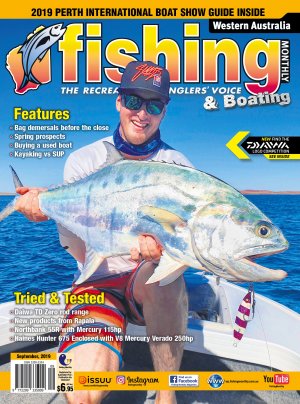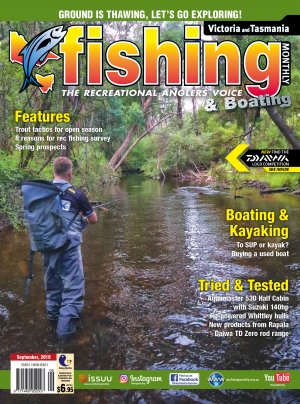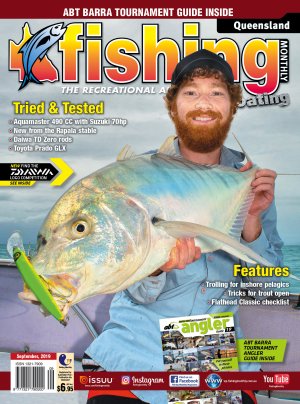Don’t you just love those days when the weather is great and the fish are almost jumping into the boat for you? Sure you do, but how often do you really get days like that? Not near often enough I’ll wager. The sad reality is the weather is rarely that good and the fish have a bad habit of playing hard to get. So what do you do, give up and go home in disgust? Of course not, you simply have to get stuck in there and find a way to pry a few of them out.
Having had my fair share of tough trips, I have come up with a set of fall back tactics that I resort to when faced with a shut-down bite. They don’t work all the time of course, but often enough they turn up some sort of action and even catching one or two fish a day is a hell of a lot better than catching no fish at all in my book.
My first rule of thumb for tough times is to look for deep water. When fish are feeling pressured or the sun is high in the sky then you can bet your bottom dollar that they will head for deeper water.
I doubt that any fish ever really feels safe, but the more water they have over their heads, the more relaxed they seem to get and the better your chance of getting them to bite is. This is particularly important in hard fished waters where there are boats going everywhere. Here the deep water acts as a buffer zone between them and all that noise going on overhead and provided you can get your bait or lure down where the fish are, then you are always in with a chance.
I know from even my limited offshore bottom fishing trips that when the close in reefs are shut down, then heading out wider into deeper water often means the difference between a good and a bad trip. In fact, it can be a good rule of thumb to keep moving deeper and deeper as the sun gets higher and higher in the sky if you are trying to keep some action going.
Fishing deep reefs often calls for vertical presentations which suit bait fishos perfectly. If you are a lure aficionado however, then your best bet is probably to give jigging a go. Your lure choice will probably depend on just how deep you are fishing. In the really deep stuff, then the new knife jigs might be the go, while in slightly shallower situations, a metal spoon or soft plastic might be more appropriate.
Don’t think that you have to head to the continental shelf to find fish. The secret is often to find water that is significantly deeper than everywhere around it, like deep holes and shipping channels. For example, I have often been able to jig mackerel off the bottom of the shipping channel in the mouth of the Burnett River. The water here is only around 10 metres, which really isn’t that deep, but the river mouth holds a lot of baitfish, which keeps the predators hanging around and the channel is simply the deepest stretch of water in that area. Consequently, it’s the place the mackerel retreat to, once a few boats start roaring around.
If fish don’t have deep water to retreat to, then the best place to look for them is deep in structure. The more pressure they are under the tighter to the timber or other structure you are likely to find them. That’s one of the reasons why accurate casting is so vital when the fish are shy. You simply have to put your lure in the fish’s strike zone, which is going to be a pretty small target given that they are feeling stressed for one reason or another.
When fish are feeling aggressive, then within 1–2m might be close enough, but when they are shut down, the margin for error might be as little as 30 cm or even less. If you can put your lure right in their face, time after time, then sooner or later you are going to draw a positive response. When it comes to lure casting for shut down fish in the snags, you can’t beat sinking lures like bibles rattlers, soft plastics, spinnerbaits or Prawnstars. Sinking lures allow you to get your offering right in tight to the structure and then drop it down vertically, right on top of the fish.
Having recently competed in an ABT Bass Tournament on Monduran Dam, I was able to watch how some of our best tournament anglers do exactly that when faced with very tough conditions. In fact, Monduran was as shut down as I have ever seen it. Thanks to our exceptionally cold winter, the water was freezing and the bass were scattered all throughout the dam. It became a matter of keeping your lure in the water as much as possible and making sure your casts were as accurate as they could be.
I was extremely fortunate to share the first day with eventual runner-up Tim Morgan and it turned out to be a very educational experience. Tim quickly worked out that spinnerbaits were going to be the best option for repeatedly casting into the thick stuff and he just kept peppering away, pulling a fish here and a fish there and while his five fish weighed in out of a possible six wasn’t a record breaking catch, it was good enough for him to finish in the money. It was also a hell of a lot better than many competitors, who caught absolutely nothing for the weekend!
What I found most interesting however was Tim’s lure selection, the attention to detail in his rigging and his choice of tackle. Tim used a compact spinnerbait, which presented a much smaller, less threatening profile in comparison to the one I was using. He also fitted it with a trailing stinger hook, to ensure that any half-hearted enquiry was turned into a hook-up. Similarly, the blades on his lure spun much more freely than mine did, which allowed him to work it slower and closer to the bottom where he knew the fish would be sitting.
His lure was presented on quite a long, soft tipped, spiral bound graphite baitcaster rod which allowed him to flick his lure into tiny gaps in the snags which great accuracy. The differences between what he and I were doing were all tiny but at the end of the day they added up to a much more effective presentation in the tough conditions, hence his five bass to my two.
The only other rule I follow when things are tough is to do what I know works, and stay confident. When the fish aren’t cooperating, you need to have complete faith in your lures and your presentation so that you don’t get disheartened. Keep telling yourself that you have the right lures or the right bait and that you just need to put them in front of some feeding fish. You won’t catch fish if your lure isn’t in the water, so above all, when things aren’t going your way, just keep casting!
Reads: 914



